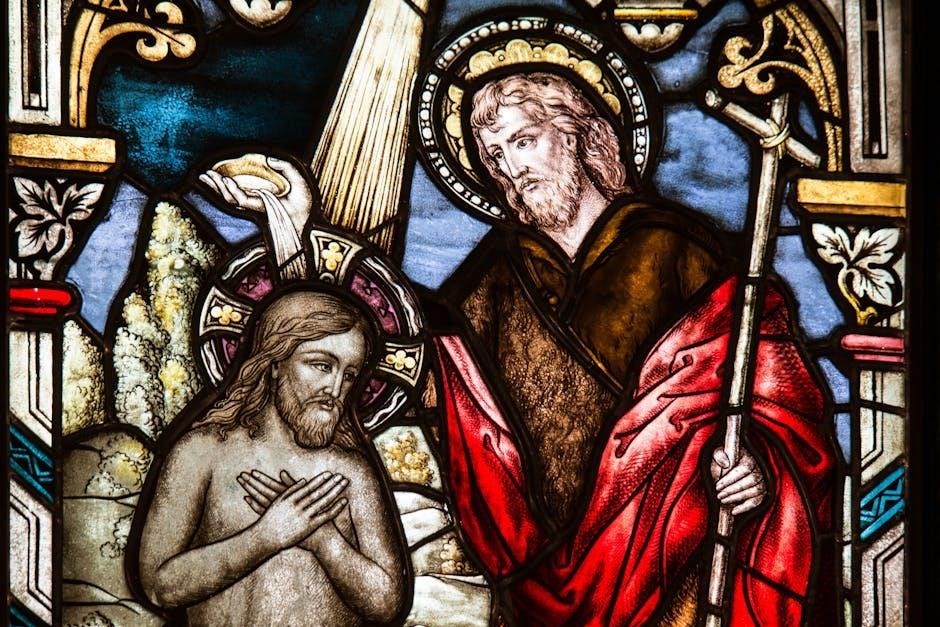The God Hypothesis proposes a transcendent creator explaining the universe’s origin and complexity. Meyer’s work highlights three scientific discoveries supporting this concept over naturalism.
1.1. Definition and Historical Context
The God Hypothesis posits that a transcendent, intelligent creator is responsible for the origin and order of the universe. Historically, this idea has roots in ancient philosophies, with thinkers like Plato and Aristotle attributing the cosmos to a divine mind. In modern times, the hypothesis has resurged, particularly through Stephen Meyer’s work, which ties scientific discoveries to theistic explanations.

The concept has evolved, blending theology with science, offering a framework to understand complex phenomena like the universe’s beginning and biological complexity. This historical backdrop underscores the hypothesis’s enduring relevance in both philosophical and scientific discourse.
1.2. The Concept of a Transcendent Creator
The concept of a transcendent creator suggests a divine being beyond the physical universe, who designed and initiated life. This idea contrasts with naturalistic views, emphasizing intelligence and purpose in creation. Meyer argues that a transcendent mind best explains the universe’s complexity, fine-tuning, and biological information. The creator is seen as both intelligent and actively involved, offering a coherent explanation for cosmic and biological phenomena. This perspective aligns with theistic traditions, providing a philosophical and scientific framework to understand existence. The transcendent creator concept is central to the God Hypothesis, linking theology with observable evidence in the natural world.
The Three Scientific Discoveries
Three scientific discoveries in cosmology, physics, and biology reveal a mind behind the universe, supporting the God Hypothesis with evidence of design and intelligence.

2.1. The Beginning of the Universe and Cosmology
The beginning of the universe, supported by Big Bang theory, suggests a cosmic start implying a transcendent cause. Meyer argues this aligns with the God Hypothesis, providing epistemic support for theism as a plausible explanation over naturalism. The universe’s origin, marked by a singularity, indicates a non-eternal, contingent existence, which theistic cosmology attributes to a creator. This perspective, while not constituting proof, offers explanatory power, resonating with historical theological concepts of a transcendent, intelligent designer. The temporal and causal nature of the universe’s beginning is thus seen as evidence favoring theism in understanding cosmic origins and the nature of reality.

2.2. The Fine-Tuning of Physics
The fine-tuning of physics refers to the precise calibration of physical constants necessary for life’s existence. Meyer argues that even minor deviations from these values would render the universe lifeless, suggesting an intelligent design. This fine-tuning supports the God Hypothesis, as it implies a purposeful arrangement rather than random chance. Theism provides a coherent explanation for this phenomenon, contrasting with naturalistic alternatives like the multiverse hypothesis, which remains speculative. The intricate balance of gravitational force, cosmic radiation, and atomic structure underscores the explanatory power of theism in addressing the universe’s fundamental order and habitability, aligning with the idea of a transcendent, intelligent creator.
2.3. The Origin of Biological Information
The origin of biological information is a cornerstone of the God Hypothesis, as highlighted by Meyer. DNA contains digital information, which cannot arise from purely physical or chemical processes. Meyer argues that the complexity and specificity of genetic codes point to an intelligent source. Naturalistic explanations, such as chance or unguided evolution, fail to account for the origin of this information. Theism, with its affirmation of a transcendent creator, provides a coherent explanation for the existence of complex biological information. This aligns with the idea that intelligence is a necessary condition for the emergence of information-rich systems, further supporting the God Hypothesis as a viable scientific and philosophical framework.

The Explanatory Power of Theism
Theism offers a coherent explanation for the universe’s existence, fine-tuning, and biological complexity, providing a more comprehensive framework than naturalistic alternatives, as argued by Meyer.
3.1; Theism vs. Naturalism in Explaining the Universe
The debate between theism and naturalism centers on which framework better explains the universe’s origins and complexity. Theistic arguments, as presented by Meyer, posit that a transcendent, intelligent creator provides a more plausible explanation for the cosmos, particularly in light of recent scientific discoveries. Naturalism, which relies solely on physical processes, struggles to account for the fine-tuning of physical constants and the emergence of complex biological systems. Meyer argues that theism, with its affirmation of a purposeful designer, offers a more comprehensive and coherent explanation for the evidence observed in cosmology, physics, and biology. This perspective has gained traction as scientific advancements uncover the universe’s intricate design.

3.2. The Role of Intelligence in Scientific Discoveries

The role of intelligence in scientific discoveries is a pivotal theme in Meyer’s argument for the God Hypothesis. He posits that the complexity and order observed in the natural world suggest intelligent design rather than random chance. Meyer highlights how scientists often uncover patterns and structures that imply purpose and intentionality, aligning with the idea of a transcendent intelligence. This perspective challenges naturalistic explanations, which often attribute such phenomena to undirected processes. By emphasizing the role of intelligence, Meyer argues that scientific discoveries increasingly support theistic interpretations, offering a more satisfactory explanation for the origins of life and the universe.

Philosophical and Theological Implications
Meyer’s argument bridges science and theology, suggesting the God Hypothesis offers profound insights into human existence and the universe’s purpose, reigniting philosophical debates about divine design.

4.1. The Interplay Between Science and Theology
The interplay between science and theology is central to Meyer’s argument, as he explores how scientific discoveries increasingly align with theistic explanations. Historically, science and theology have often been seen as separate realms, but Meyer argues that recent findings in cosmology, physics, and biology bridge this divide. The fine-tuning of the universe and the origins of life, for instance, suggest a level of design that resonates with theological concepts of a creator. This interplay challenges the notion that science and religion are inherently opposed, instead highlighting how they can complement each other in understanding the universe’s complexity and purpose.
4.2. The God Hypothesis and Human Existence
The God Hypothesis offers a profound framework for understanding human existence, suggesting that life is not merely a cosmic accident but the result of intentional design. Meyer argues that the universe’s fine-tuning and the emergence of complex life point to a purposeful creator, imparting human existence with inherent meaning and dignity. This perspective contrasts with naturalistic views, which often struggle to account for the uniqueness of human consciousness and moral agency. The God Hypothesis, therefore, provides a compelling narrative for human purpose, aligning with theological traditions that emphasize humanity’s special place in creation. This idea resonates deeply, offering a sense of significance in an otherwise vast and complex universe.
Meyer’s work reignites debate on theism’s relevance in modern science, offering a compelling case that resonates culturally, bridging faith and reason in contemporary discourse.
5.1. The Resurgence of the God Hypothesis in Modern Science
The resurgence of the God Hypothesis in modern science, as discussed in Meyer’s work, reflects a growing recognition of theism’s explanatory power. Recent discoveries in cosmology, physics, and biology have led to a reevaluation of naturalism’s adequacy. The fine-tuning of the universe and the complexity of biological information are cited as evidence that points to an intelligent creator. This shift challenges the dominance of purely materialistic explanations, highlighting the potential for theistic perspectives to complement scientific inquiry. Meyer argues that theism offers a more comprehensive framework for understanding the origins of life and the cosmos, thereby influencing contemporary scientific and philosophical discourse.
5.2. The Broader Impact on Society and Philosophy
The resurgence of the God Hypothesis, as explored in Meyer’s work, has significant implications for society and philosophy. By challenging naturalistic worldviews, it reopens discussions about the integration of science and theology, offering a framework that aligns scientific discoveries with theistic beliefs. This shift influences cultural narratives, encouraging a reevaluation of morality, purpose, and human existence. The book’s arguments resonate beyond academia, sparking public debates about the limits of materialism and the plausibility of intelligent design. Meyer’s thesis also addresses the perception that theism is incompatible with science, fostering a more inclusive dialogue between faith and reason. Ultimately, it challenges society to consider the deeper philosophical questions about the nature of reality and humanity’s place within it.